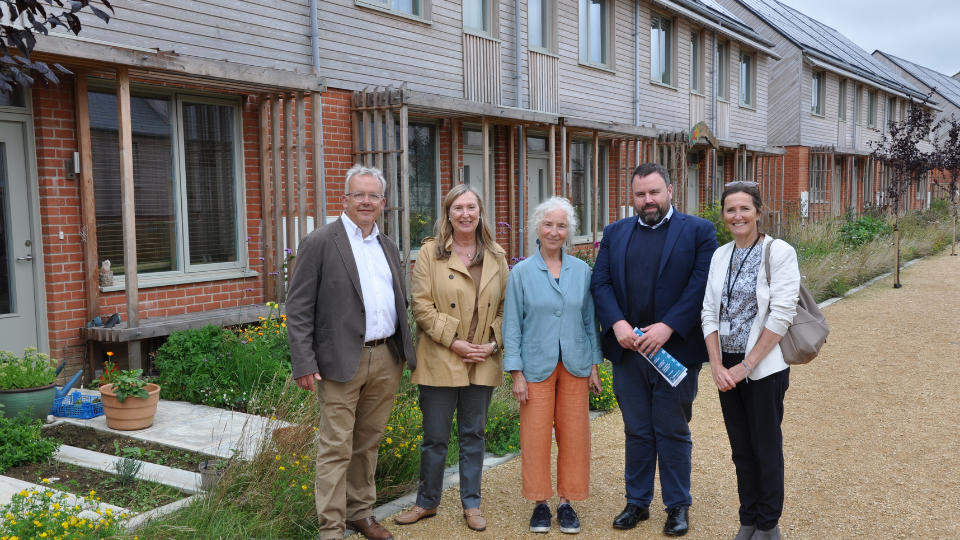Casey Edwards appeals for housing associations to work with the community-led housing sector to deliver affordable homes for local people.
The best interest of tenants
 According to Welsh Government’s Regulatory Principles, any registered social landlord (RSL) mergers, groups or partnerships must ensure that the proposed structure is in the best interests of its tenants and service users. At Cwmpas, we believe that it is tenants and residents themselves who know what is best for them and they should have autonomy and agency over decisions made about the homes and communities that they live in.
According to Welsh Government’s Regulatory Principles, any registered social landlord (RSL) mergers, groups or partnerships must ensure that the proposed structure is in the best interests of its tenants and service users. At Cwmpas, we believe that it is tenants and residents themselves who know what is best for them and they should have autonomy and agency over decisions made about the homes and communities that they live in.
Community-led housing is a powerful approach that brings communities together to decide what kinds of homes and communities they want to live in and empowers local people to create their own decent and affordable homes. Community-led housing (CLH) can take many different forms, such as co-operatives, community land trusts, cohousing, tenant management cooperative, community self-build, plus many others. What they have in common is that they are all based on the principle of community control of affordable housing.
You could say that many RSLs started life this way, as small organisations seeking to solve local housing problems. Many continue to work in this way. But given the theme of this issue, and mergers happening across Wales, it feels that RSLs are becoming more removed from the communities that they were established to serve.
Community-led housing provides RSLs with an opportunity to re-connect with communities at a hyper-local level and work in partnership to deliver affordable homes that meet local need and put residents at the heart of decision making.
The roles that housing associations can play
Housing associations can play a variety of roles in supporting and enabling CLH. Like CLH itself, there is no one size fits all approach to but RSLs and CLH groups both have valuable skills and resources to bring to the table, which can help to tackle the affordable housing crisis together. The roles they take on depend on numerous factors including, most importantly, the needs and requirements of the community group, but also the capacity and interests of the RSL.
A critical friend and capacity builder
Some associations may be prepared to give some initial advice and guidance to CLH groups at the early stages – to test ideas, explore the opportunities, understand the development process, including the hurdles to be overcome. Such advice and guidance are likely to be given informally by a friendly individual rather than through official channels.
Some RSLs may offer more extensive support on a range of relevant topics such as developing a viable housing scheme, understanding housing need, collaborating with the local authority, developing a business plan, funding options, partnership working and so on.
Development agent
Some CLH groups will appoint an RSL to manage the development process acting as a development agent, due to their experience and expertise in this area. This could include detailed design of the project, land acquisition, site investigations, obtaining planning permission, securing funding, appointing contractors etc.
Partner
Some CLH groups will work in partnership with an RSL for the duration of a project. CLH groups can bring land and local knowledge to the project, with RSLs brining development expertise and access to finance. Some RSLs may even initiate a CLH project or look to dispose of land or properties to a CLH group that might be surplus to their requirements.
Managing agent
Some CLH groups may procure an RSL to manage the homes once they are constructed/refurbished, if the community organisation does not have capacity/desire itself.
However, currently, the number of RSLs that are involved in actively supporting CLH projects remains extremely small in Wales. So now we know how they can get involved, let us look at the why they should.
Here are five reasons an RSL should work with CLH groups:
- Bringing forward new affordable homes tailored the local need
CLH groups and RSLs share a common mission of developing high quality, affordable housing that meets local need. CLH groups will deliver homes that meet the hyper-local needs of an area, meaning that communities are not displaced, young people can afford to live where they were born and bred, village shops and schools remain open. And because the prices are protected in perpetuity, future generations will benefit from them too.
- Autonomy and agency
When future residents lead on and participate in development and management process of delivering new homes, it fosters a sense of ownership and community. People are empowered to make decisions about their own future, and even learn new skills along the way.
- Unlocking sites and finance
CLH groups may be able to access land and empty buildings that would not be made available to RSLs; for example, local landowners who prefer to give their land to a local CLH organisation. CLH groups may also be able to access alternative pots of funding, including raising community finance.
- People are really good place makers
Who is better to design and develop homes and communities than the people that will live there? Homes and communities that are designed by local people are built with their friends and neighbours in mind, not profits. They will be high quality and truly consider what people really need to be able to live happily and independently.
- More than housing
Research[1] has shown that CLH provides more than just an affordable home over one head, it also comes with wider health and wellbeing benefits. It can help to reduce loneliness, tackle social isolation, improve community cohesion, even reduce pressure on health and social services.
Sharing good practice
There is a strong tradition across England of housing associations supporting the CLH sector. In Bristol and South Gloucestershire, Brighter Places aims to have 30 per cent of its development programme supporting community-led schemes. On the South Coast, BCHA has worked with Bridport Cohousing (below) to deliver the UK’s biggest cohousing project.[2] In Middlesborough, North Ormesby CLT acquired six hard-to-led properties from one housing association and subsequently worked with another to bring them up to standard and manage them long term.[3]

It is even happening little by little here in Wales too. Nolton and Roch CLT os working with Ateb Housing Association to deliver 19 low carbon, social rent homes for local people in Pembrokeshire. The CLT has received a grant from the local authority to buy the land (raised from the tax on second homes) which will then be leased to Ateb to develop and manage the homes, with input from the CLT every step of the way.
Cwmpas is currently supporting 34 projects across Wales looking to deliver 231 affordable homes – from Chepstow to Crymych to Criccieth. We provide support to community groups and organisations embarking on this journey from conception of a project idea to the completion of affordable homes, via our team of accredited CLH enablers.
And there is political will to see more CLH in Wales too. It is written into the Programme for Government, the Co-operation Agreement, and recently Planning Policy Wales has been updated to include reference to CLH delivering affordable homes.
Homes are the foundation of our lives. They are essential to our physical health, mental health, and wellbeing. Yet the housing system is failing many people who need it to provide them with a solid foundation. We do not have the right number of homes, the right type of homes or homes in the right places so do not we need as many ways of delivering affordable homes that meet local need as possible?
RSLs can help the CLH sector to deliver these homes at a faster pace and at scale, but always having the communities’ best interests throughout development. CLH groups can help RSLs to meet their affordable housing targets, but also help to create cohesive and resilient communities, where residents are engaged and care about what happens in their local area. Let us harness the care that people feel about their communities and work together to bring forward homes and communities that are affordable and low carbon, but also places that improve our health, wellbeing, and life prospects.
Want to know more? The Communities Creating Homes team would love to hear from you about how we can work in partnership with communities to tackle the housing crisis together. Contact us at: co-op.housing@cwmpas.coop
Casey Edwards is the Communities Creating Homes programme manager at Cwmpas. The programme supports communities to develop their own co-operative and community-led housing schemes to grow the number of affordable, low-carbon homes available for people in need. This project is funded by the Nationwide Foundation and Welsh Government.
[1] ‘Those little connections’: Community-led housing and loneliness (publishing.service.gov.uk)
[2] Affordable new homes at Hazelmead Cohousing in Bridport | BCHA
[3] HA_CLT Partnerships – North Ormesby, May 2020.pdf (communityledhomes.org.uk)